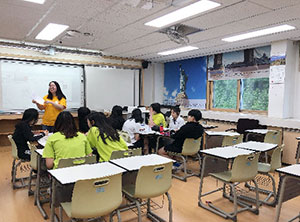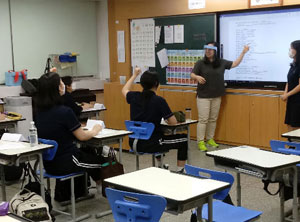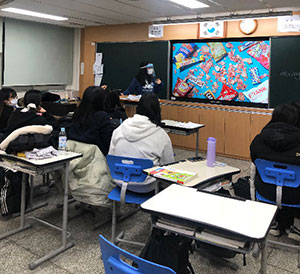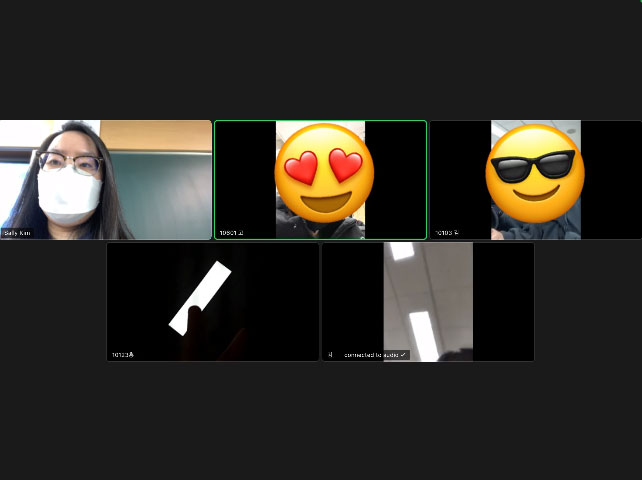
-
Teaching amidst the Pandemic: 5 Stages of Grief
Min Jeong Kim
COVID-19. That’s it. That was the year 2020. In a way, a lot had happened yet not much happened and it felt very short yet very long at the same time. As a teacher? This year has been the toughest and most challenging year in my 4 years of teaching career all thanks to COVID-19.
A Swiss-American psychiatrist Elisabeth Kübler-Ross conceptualized five stages of grief that a patient with a terminal illness goes through when faced with one’s own death in 1969. Based on this model, people go through series of emotional stages of: Denial, Anger, Bargaining, Depression and Acceptance. Although this model was initially conceptualized in reflections of the patients faced with deaths, I believe this model can be applied in our contemporary society during pandemic as we have been ups and downs on our emotional roller coasters in the wake of the crisis since the beginning of the year. And this is how my 2020 went down as an EPIK Teacher in Korea.

Class before the pandemic.

Class during the pandemic, before the second wave of COVID-19.
1. Denial (January - March 2020)
When COVID-19 cases began to show up in Korea in January, I was not too worried about it since I pride myself on always maintaining a great personal hygiene. I washed my hands as if I was a surgeon about to operate, dapped while sneezing and coughing and had plentiful of KF-94 masks at home due to the fine dust particles. While others were busy panic buying masks and hand sanitizers, I sat back and watched Contagion again at home. Even when COVID-19 cases began to show up worldwide I thought to myself, only people with bad hygiene gets it hence I have nothing to worry about and if I simply follow my normal personal hygiene routine then I will be safe. I figured this would be another illnesses like a seasonal flu since it was winter and flu season and soon will disappear because we do have doctors and scientists for a reason right? No. On March 11th, 2020 World Health Organization (WHO) declared a pandemic and our lives were changed forever.
2. Anger (April – May 2020)
I WAS FRUSTRATED. I just could not believe why we could not have stopped this from spreading. It simply required us to wash our hands frequently and wear masks to prevent COVID-19 from spreading. But why could not we have done that? At this point I was still a bit naïve about not getting COVID-19 so I was more upset about not being able to carry on with my daily activities such as going to the theatres and cafés and hanging out with my friends. I WAS FURIOUS. Increase of global COVID-19 cases had resulted in unforeseen and horrendous acts against the visible minorities. People with Asian backgrounds have now become targets of racism and discrimination, inspired by COVID-19. Although I was the majority in Korea as I am a Korean-Canadian, having a family that live in Australia and Canada, this pandemic meant to survive not from the virus but from the hate crimes that resulted from it. I WAS FRETFUL. Schools could not open on March 2nd the way it always had been and students could not come back to school. I was not able to teach and/or meet my students. Schools were closed indefinitely. It felt like the world has collapsed.
3. Bargaining (June 2020)
I slowly came into terms with this “COVID-19.” If I keep my mask on all time, keep my distance from others, wash my hands frequently and not touch my face, I would be safe. If only we follow these simple guidelines, my family and I would be safe and this would soon be all over. If only we…

Class after the second wave of COVID-19.
4. Depression (July – September 2020)
Equipped with KF-94 mask and face shield.
Then came the depression. I was professionally unsatisfied. School did eventually open but students were only allowed to come to school once a week. This made me feel worthless as a teacher. The fact that I was not able to teach, my sole purpose and responsibility made my professional life meaningless. I was only teaching few classes, if I was lucky. If it was a day where the grades 1 and 2 were coming to school, then I was not teaching at all and I would just come to school to do nothing.
I was personally unsatisfied. Limiting my activities to just home, school and grocery stores mentally drained me. Not being able to go to a café and drink my favourite coffee, not being able to go to the theatre and watch an amazing Korean independent film and not being able to hang out with my friends and enjoy the great weather felt like a death sentence. I felt extremely guilty. Thanks to “K-Quarantine” model, I was relatively safe compared to my family in Australia and Canada. I had access to great health care system and masks and I still had my job. Although I was still very cautious I was able to do more than just go to school and grocery stores. On the other side of the world in Canada, my parents were laid off (Canada went under a lockdown earlier in the year and a lot of people were laid off as a result) and my brother in Australia was under the lockdown which lasted for 111 days (which later ended on October 28th, 2020). Then the second wave of pandemic hit Korea.
5. Acceptance (October – Present)
By this point it has been pretty clear that COVID-19 will be part of our lives for who know how long and this meant I could no longer drown in self pity hoping for it to go away because it was not, at least not for anytime soon. I had to adapt to the “new normal” and “new future” and rebuild my personal and professional life around it. I had to reform my lessons so that it is now “COVID-19 friendly.” This unfortunately meant I could no longer play 4 Corners with my elementary school students, one of their favourite games. Instead, I continued to do the usual activities and games that can be done while sitting down like writing telepathy games but made it more fun and engaging by being loud and entertaining to make up for the lack of mobility of the games.
With my high school students on Zoom, I had to change my lesson plans as a whole. Prior to COVID-19, I created my lessons that target listening, writing and speaking aspects of English. But now that classes have been moved to online, I had to refocus my lessons to target more on speaking aspect partly because that is what the students wanted but also because I could not ask them to do writing activities or group activities when I cannot properly observe and help them on Zoom.
To better accommodate the uniqueness of the Zoom classes, I set aside a block of time every class to converse with my students as a way to practice and improve their speaking abilities. During that time we talked about things they were interested in such as K-pop, dramas that they are currently watching and school lives in Korea and North America. Not only this was the time that I got to know more about them, it also served as a cultural lesson. They had great interest in studying and traveling abroad, especially to North America therefore they had lots of questions about my life back in Canada. We also spent time answering questions like, “If you have to choose between bread and rice, what would you choose?” and the follow up questions like “What’s your favourite Korean and non-Korean food?” To make answering this question tougher than it sounds, I would expand from their answers of rice by commenting that since they chose rice from now on they cannot have macarons, their birthday cakes or even 떡볶이 (since they preferred 떡볶이 made with 밀가루 떡 (rice cake made not with rice but with flour).

Zoom class, a new normal and new future of education.
In retrospect, this year has not been easy at all. As much as it was a challenge for me, it was also a learning experience too. With extra time all to myself, I was able to get to know myself better and therefore was able to grow both personally and professionally. This pandemic helped me rethink about the lessons that I have been doing thus far. I began to question myself, “Is this really the best for my students?” and “What can I do to make learning during pandemic better?” I began to incorporate new teaching methods, activities and games. Although it was difficult at first, I am glad I have done it. As an experienced EPIK Teacher, there is only one thing that I can say to the future EPIK Teachers and that is to be not afraid. Do not be afraid of the pandemic. The schools are following the guidelines to provide the safest learning and teaching environment for the students and teachers. Do not be afraid to challenge yourself. Challenge yourself to become a better teacher, try a new activity, and create a new lesson plan. This shall too pass and at the end you will have become a better person and a better teacher.
English Program in Korea(EPIK), Teach and Learn in Korea(TaLK)
National Institute for International Education Ministry of Education, Republic of Korea
191, Jeongjail-ro, Bundang-gu, Seongnam-si, Gyeonggi-do, Republic of Korea (zip code) 13557 Tel : +82-2-3668-1400 Fax: +82-2-764-1328
National Institute for International Education Ministry of Education, Republic of Korea
191, Jeongjail-ro, Bundang-gu, Seongnam-si, Gyeonggi-do, Republic of Korea (zip code) 13557 Tel : +82-2-3668-1400 Fax: +82-2-764-1328


